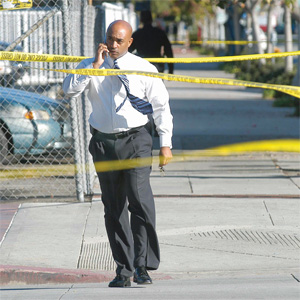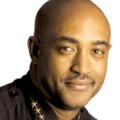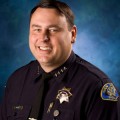Anthony Batts moved his way up the ranks of the Long Beach Police Department over 20 years, steadily picking up specialized training as he earned awards and accolades before becoming chief. After seven years in that job, where he was able to oversee a significant reduction of violent crime, Batts moved on to Oakland with a promise to save the city—whose young African American men were being murdered at an alarming rate—and lead a department shaken by the killing of four officers.
Fourteen months later, Batts is already planning to move again.
He has by all accounts made genuine progress in Oakland. His supporters, who include Assemblyman Sandre Swanson (D-Alameda) and Oakland City Council President Larry Reid, point to his ability to engage the community while reducing crime, creating optimism within the department and the city at large. But there is also some criticism, emerging from Reid and others, since Batts let it be known that he may be jumping ship.
A recent report by Ali Winston, a producer for KALW Radio in Oakland, suggests Batts might want to come here because Oakland faces a real threat of having its police department placed under federal receivership. The result would be a black eye on Batts’ mostly pristine record, despite his brief tenure in overseeing a department that was battling a multitude of issues well before his arrival.
Winston reports that a Negotiated Settlement Agreement signed in 2003, and originally designed to expire in 2008, has had the department under the watchful eye of independent monitor Robert Warshaw, a former assistant police chief in Miami. Reports from Warshaw, submitted to U.S. District Court Judge Thelton Henderson, conclude that the OPD is failing in its obligations to clean up its act following the infamous “Riders” scandal, which found evidence of police brutality and evidence planting more than a decade ago.
The next report from Warshaw is expected to come this month, and attorneys representing more than 119 plaintiffs who filed suit against the city of Oakland for pervasive police misconduct said in a recent court filing that the OPD is unlikely to meet its goals and obligations once again.
Judge Henderson seems to agree with this assumption, according to a court filing he wrote in December.
“It is difficult to imagine that Defendants’ promises of substantial compliance in a few short weeks are grounded in reality,” Henderson wrote, adding that Batts should shoulder some of the blame.
Henderson points to a use-of-force incident which, he said, “highlights potential problems … with the culture of the Department, up to and including the Chief of Police, who concurred with the investigative finding that the force was not excessive.”
The OPD has said it is optimistic it will hit its deadline, but that the department has also been hamstrung in meeting expectations due to heavy cutbacks in staffing.
John Burris, an attorney representing plaintiffs in the civil suit that led to the Settlement Agreement, said he can see why Batts might choose to move on.
“If the department goes into receivership while he’s the chief, that raises questions about his leadership, of course,” Burris says. “A chief can look at it more than one way. He can run and try to get away or he can say, ‘I’m going to use my talents and get through this.’ That would speak well of any person. That’s part of what leadership is about.”
But Burris doesn’t believe fear of blame is driving Batts’ decision.
{pagebreak}
“Chief Batts is a very ambitious man and it’s not surprising to me that he would seek other opportunities to enhance his career,” Burris says. “Having observed him, and knowing the grand scheme of who he is, that’s what he’s geared for.”
Change Candidate
After years of controversy under Chief Rob Davis, many in San Jose want a new kind of leadership at the SJPD.
Councilman Sam Liccardo says the next chief will need to bring new ideas to the table. “Times of scarcity require innovative leaders,” Liccardo says, “and what we’re facing in San Jose today and for much of the foreseeable future will require enormous creativity.”
The city has been pushing for pay cuts and reformed pension plans with police and firefighters in order to prevent layoffs. And a report on Monday that the city’s deficit was underestimated by roughly $20 million will require radical new thinking, Liccardo says.
The path Batts has taken to this point stands in stark contrast to Figone’s other finalist, San Jose’s acting police chief, Christopher Moore. Moore, regarded as highly intelligent and responsive, has spent his entire career in San Jose and was groomed to become chief by Davis, his predecessor, who retired under heavy criticism late last year.
Deciding who is more prepared to lead San Jose in these uncertain times has made the decision more complex than the simplistic way some have tried to shape the debate: outsider vs. insider, black man vs. white man.
“I’ll mention it since it’s the elephant in the room,” Liccardo says. “In regards to a police chief’s ability to serve communities of color, it’s less relevant the color of the applicant’s skin and more relevant the quality of the candidate’s listening skills.
“Race is always an issue in urban politics, but I’d like to believe we’re moving beyond white-vs.-black stereotypes in making choices about San Jose’s next leaders.”
Liccardo notes that San Jose has an African American fire chief, William McDonald, and that the Independent Police Auditor, LaDoris Cordell, is also African American. But complaints of racial profiling and overly aggressive street policing downtown have many pushing for a fresh face, even if the decision is largely symbolic.
“There needs to be a signal sent by the city that the issues of broken trust and the collective call for change is being honored,” says Raj Jayadev of Silicon Valley DeBug, an Eastside organization that works with young artists and others who’ve had contact with the criminal justice system.
Jayadev and other community activists have called for the selection process to be more transparent from the start. Now that the final two candidates names are public—even if they’re not officially acknowledged by the city—he believes the final interviews should be held in public.
Councilman Pete Constant disagrees. He says Figone has kept things confidential to protect the integrity of the process. In Constant’s opinion, it’s already become tainted by the leaking of Batts’ name.
“If he’s not selected, we have put him in an interesting position—where he has been somewhat chastised by his department for looking at the outside,” says Constant, himself a 14-year veteran of the SJPD. “If you want to attract the best candidates, honoring the confidentiality of the process is an important thing to do.”

 Food & Wine Events: Jan.26-Feb.2
Food & Wine Events: Jan.26-Feb.2  Review: Puro Peru
Review: Puro Peru 

